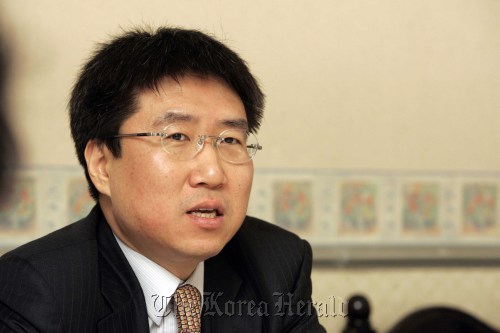Says free trade benefits vary with levels of development
A noted critic of free trade agreements has offered a mixed assessment of a potential FTA between South Korea and China.
Chang Ha-joon, an economist at the University of Cambridge in the U.K., has written numerous publications critical of free trade agreements. In books such as “Bad Samaritans: The Myth of Free Trade and the Secret History of Capitalism,” he writes that nations such as the U.S. and U.K. have used protectionism to turn themselves into economic powers, but now insist that developing nations do the opposite.

Prof. Chang Ha-joon of the University of Cambridge in Britain (Park Hae-mook/The Korea Herald)
For this reason, Chang opposes the FTAs that Korea has signed with the U.S. and EU but not yet ratified, saying that they would harm Korea’s ability to develop its own industries.
China, though, is a somewhat different case, Chang told The Korea Herald last week.
“If you have a free trade agreement with a more advanced country and a more backward country it’s more in the interest of the advanced country, so yes, if we signed it with China we will be the main beneficiaries,” he said.
Earlier this week, Prime Minister Kim Hwang-sik said that Korea should begin “meticulous and creative” preparations to see how an FTA with China would affect its own economy. Two weeks ago, the Samsung Economic Research Institute said that the proposed FTA would boost Korea’s GDP by nearly 3 percent.
That said, Chang has some doubt about the hypothetical deal’s prospects.
“China’s a bit of a special case because no other country at China’s level of income has the ability to build nuclear reactors, send men in space ... build aircraft,” he said. “It’s got a peculiar history because of the socialist experiment and the arms race.
“It’s sheer size has equipped it with some unusual capabilities which you don’t expect to see from countries at that level ... so the relative benefit that we get from signing that kind of agreement with China would be far less the one we could get from signing such an agreement with another country with a similar level of income.”
Chang’s latest book, “23 Things They Don’t Tell You About Capitalism,” is a sharp broadside aimed not only at free trade, but “free market” policies in general that Chang believes have damaged the world economy. Nearly three years since the global financial crisis, the Korean economist sees more members of his profession taking an interest in government intervention, including in the areas of financial regulation and fiscal policy.
However, “among professional economists allegiance to free trade is the last thing that people will abandon,” he said. “A lot of people who used to be in favor of a more laissez-faire approach have changed their mind. Whether that has happened to free trade is a different story.
“In today’s mainstream economics, basically one’s belief in free trade is like the ultimate test for one’s credentials as a liberal economist.”
In addition to his concern about development of industry, Chang also feels “free trade” is a misleading name for these kinds of bilateral agreements, as they implicitly discriminate against other countries not included in the deal.
“Why have we set up the World Trade Organization (except to) avoid having to negotiate with everybody?” he said. “It’s very costly, and it isn’t even proper free trade ... why does Korea have to kind of take the lead in actually destroying this multilateral trading order? I don’t think that is the right approach.”
By Rob York (
rjamesyork@heraldcorp.com)






![[KH Explains] How should Korea adjust its trade defenses against Chinese EVs?](http://res.heraldm.com/phpwas/restmb_idxmake.php?idx=645&simg=/content/image/2024/04/15/20240415050562_0.jpg&u=20240415144419)